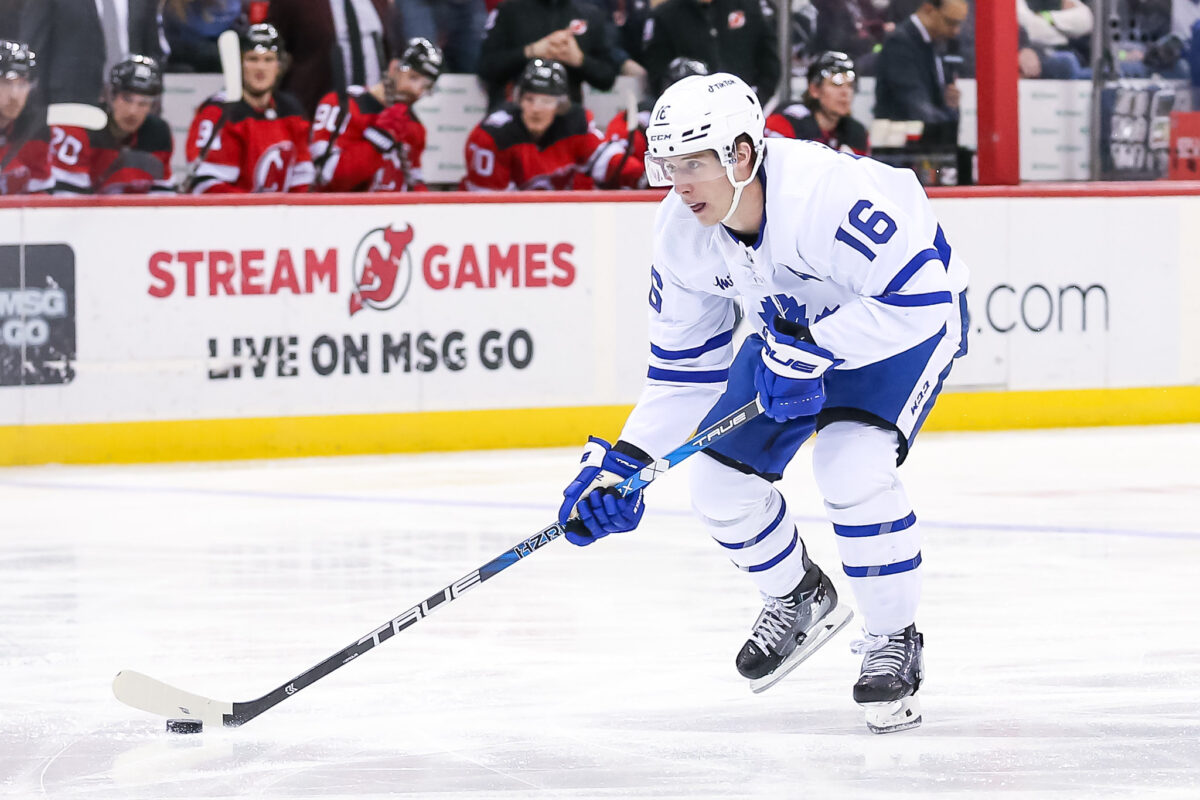In a recent episode of his “32 Thoughts” podcast, the ever-insightful Elliotte Friedman couldn’t resist injecting a touch of humor into the discussion surrounding Mitch Marner and his upcoming contract negotiations. With Auston Matthews‘ $11.634 million AAV deal now in the rearview mirror (he signed it in February 2019), Friedman playfully pondered Marner’s potential contract number.
With a huge hint of tongue-in-cheek (and even perhaps a bit of cynicism), Friedman asked, “What is Marner’s next number? Because he was the closest one to Matthews. When Matthews signed for $11.634 AAV, all of a sudden Marner became close to an $11 million player, so now Matthews’ number is 13.25. What’s Marner’s number? Is it 13.249999?”
Negotiating Salaries for Star Players Is Complex
Friedman’s witty take on the situation adds a bit of levity to the ongoing contract discussions. However, it also highlights the complexities and nuances of NHL salary negotiations.
Related: 3 Biggest Trades in Red Wings History
[As an aside, for anyone wanting a solid read in non-academic language in an academic journal written by a former player agent, the link offers some interesting insight into contract negotiations. It’s a good read. David B. Falk (1992), The Art of Contract Negotiation, Marquette Sports Law Review, 3(1), Article 4.]
Negotiating with star players in the NHL can be complex and delicate. One of the Maple Leafs’ most prominent stars, Marner, is a particular case in point. He deserves a good contract from the team, but what would that contract look like?
What Is a Good Contract?
Contracts are not just about how good a player is. In addition, contracts in professional sports also attend to the concept of fair market value within the context of the negotiations (in this case, NHL contracts done in the salary-cap era). In professional sports, those two understandings (quality of performance and fair market value) help both negotiating parties work to ensure fair compensation, mutual respect, and transparency between the organization, the player, and the fans as well.
The definition of a “good contract” is that it’s fair for both sides. The best negotiations also follow honest and transparent strategies based on mutual consideration and respect. It would be nice to expect such when the Maple Leafs and Marner’s team sit down to talk.
Related: Revisiting Maple Leafs & Marner’s 2019 Contract Negotiations
In working toward this strategy, it’s better to adopt a negotiation strategy that doesn’t leave a bad taste in anyone’s mouth. In my opinion, that was not the case during the last negotiations completed between the Maple Leafs and Marner in 2019.

Because these negotiations worked for Marner – in that, Marner got basically what his team wanted in the negotiations – there is little reason to believe things will be different this time. That fact was not lost on Friedman, which I noted when I started this post.
The Maple Leafs History Negotiating with Mitch Marner
Here I want to quickly revisit (I admit this is my take) the contract negotiations between Marner and the Maple Leafs. In my mind, the process shaped Marner’s image among fans and his relationship with the team.
Point One: Marner Came to the 2019 Negotiations With Status
When Marner entered his first negotiations, he carried the status of initial success. He was highly regarded by fans when he joined the Maple Leafs, and he had done little to diminish that status. Over his first seasons on his entry-level contract (ELC), he showcased his skills and potential for greatness. Over those initial seasons, his game continued to grow and he was rightfully considered a valuable asset to the team both offensively and defensively.
Point Two: Marner Became a Polarizing Figure During The Negotiations
Despite his on-ice success, Marner polarized fans during contract negotiations in 2019. Some fans even began to question his value to the team. From my perspective, it has taken time him years to regain his positive status, but he’s achieved that with most fans. Sadly, other fans haven’t forgotten and still would like him driven out of town.

The problem for me was Marner’s agent’s (Darren Ferris) negotiating strategy. Ferris employed a strategy that placed himself and his client (Marner) in a strong negotiating position. However, in doing so, he soured Marner’s image with fans. His strategy included publicly challenging the team’s commitment to Marner and suggesting that Marner would play in Switzerland if he didn’t get more money.
Point Three: Over the Past Seasons Marner’s Image Has Improved
Over time, Marner has rehabilitated his image. Like him or not, he’s a great hockey player. His recent performances have helped. However, not all fans have been won over.
Related: Ex-Maple Leafs Goalie Michael Hutchinson: Where’s He Now?
Marner’s relationship with fans remains a work in progress, and his future performance both on and off the ice might determine whether he fully regains their trust and his status. Ironically, given his affability as a person (he’s in the middle of every party and his charity work is notable), a well-liked and respected Marner would be a boon to Leafs Nation.
Point Four: Marner Missed a Chance to Solidify His Legacy
If Matthews’ recent contract negotiations serve as a lesson, it would be that any tempestuous relationships between negotiating parties be kept behind closed doors. Matthews will become the highest NHL player when his contract comes into play in the 2024-25 season. Yet, the aftermath of the deal is sitting pretty well with the public. In fact, both Maple Leafs general manager (GM) Brad Treliving and Matthews seem to be resonating well with fans.

The constructed narrative was one of cooperation and team commitment. These are values that fans appreciate – as they should.
After Matthews Contract Extension, What Is Fair Market Value for Marner?
Matthews’ recent four-year contract extension with the Maple Leafs is now in the books. It will make him the NHL’s highest-earning player from the 2024-25 season at $13.25 million per year. Clearly, that contract has ripple effects on his teammates, particularly Marner and William Nylander.
Related: The NHL’s Best Farm Systems Ranked – 2023-24 Preseason Update
Because Marner is known for his tough negotiations in the past, that puts pressure on Treliving as the team’s current GM (as it did for Dubas in the past). The upcoming offseason is expected to bring similar negotiation tactics from Marner’s team. As noted, Friedman already anticipated the “fun” starting with the negotiations. Given Matthews’ new deal, Marner’s number is speculated to be at least $13 million annually.
Whatever Marner’s next deal might be, it’s expected to be lucrative. Based on Marner’s last negotiations, the dynamics of the process are also expected to be difficult. My question is: Is there a better way?
In the rest of this post, I’ll speculate another path the Maple Leafs might follow. In this, I’m not taking either side of the argument. I hope that contracts reward players for the quality of their play as well as represent fair market value. What I do wish to eliminate is the kind of public posturing that calls into question the other side’s intentions.
We all know what’s going on here and theoretically how it works, but I’d sure love to find a way to eliminate the negativity – both immediate and lasting.
A Strategic Play for Dealing with Marner’s Upcoming Negotiations
Here’s what I think could be a reasonable 10-step process that values both sides in this process.
Step One: The Maple Leafs Should Define a Fair (Even Generous) Offer
First, assuming that Marner is wanted on the team, the Maple Leafs should begin by determining what a fair and (even) generous offer for his services would be. Invite Marner’s team to present what they believe is a reasonable request. This request should be taken seriously and should serve as a foundation for internal discussions and for future negotiations.
Step Two: Spend Time Deciding Internally What the Team’s Offer to Marner Will Be
Spend due diligence in discussions about Marner and what the right offer is for the team. It should be based on the quality of his performance, fair market value (considering comparables), and the salary-cap context. As noted, it should be a fair and even generous offer.
Step Three: Publicly Disclose the Offer
Inform Marner and his agent of the offered number upfront and invite them to accept it. Emphasize that this number will not be subject to further negotiation at this time or until the 2024-25 season is completed.

If Marner’s team accepts the offer, all’s well and good. Sign and announce. If they don’t, make the offered number and terms public. At the same time, be transparent about the team’s stance on negotiations. Note that the organization has told Marner’s team that there will be no further negotiations until Marner has completed playing the final season on his contract. Clearly communicate to the public that this is the team’s final offer until after the season.
Step Four: Don’t Blink on the Plan
My guess is that Marner’s side will try to challenge these terms. But the organization should not blink despite any posturing, or other public discourse, or persuasive attempts.
Related: Maple Leafs’ 5 Best Wingers of All Time
In light of these, continue to communicate the organization’s stance and willingness to sign at any time. But the key is to be silent in the face of what comes and to remain firm in the team’s position.
Step Five: Continue to Maintain Silence
Perhaps this shouldn’t be the same step twice, but it will take an act of the will to not respond in the face of external challenges, either from Marner’s team, the media, or perhaps public pressure.
The two “Rs” – remain (silent) and reiterate (the organization’s contract terms) would come into play.
Step Six: Allow Marner’s Contract to Expire
If Marner does not sign the offered contract, let him play out his current contract without further negotiations. When his 2024-24 season is in the record books, internally revisit the contract and make any adjustments called for by Marner’s success or failure over the season.
Step Seven: Adjust Based on Performance
Adjust the contract numbers offered based on Marner’s performance during his contract year and other contextual factors like the salary cap.

If Marner has a monster season, perhaps the numbers should be upped. If he has a poor season, perhaps the numbers should fall. If he has his average season (of great play, by the way), they can stand firm.
Step Eight: Allow Marner’s Team to Submit Another Contract Offer
Allow Marner and his agent to submit their contract offer, and evaluate it objectively before accepting or rejecting that offer.
Step Nine: Invite Marner to Test the Market
Present again the numbers decided by the organization, and give Marner a chance to sign at that time. If he does not, allow him to test the free-agent market.
Step Ten: Allow Other Teams to Offer Contracts
If other teams will meet Marner’s financial contract demands and he wishes to leave Toronto, wish him well and let him go. Spend the money the organization would have spent on his salary on free agents and build your team around Matthews and the remaining players.
Considering the Assumptions and the Impact
Who knows what will transpire? The onus now rests with Marner to decide his career path. Can one assume he won’t find a comparable salary with another team? Or, can one assume that, although the salary might not be higher, the offering team isn’t attractive enough (for one reason or another) for him to make a move?
Related: The Best Nicknames in Hockey
Although Marner is an excellent player, another team might not find his contract demands fit into their salary-cap structure or their budget. At the same time, perhaps Marner would consider the value of his attachment to Toronto and his desire to play alongside Matthews or others. As I say, who knows?
The best-case scenario would be that Marner is offered more money with another team, but he decides to stay in Toronto for less. If so, his decision could become heroic. It might cement his loyalty to the team and his unselfish nature. Both the organization and Marner could turn this into a win-win situation.
The Bottom Line
Ultimately, these negotiation strategies hope to reshape how business is conducted within the Maple Leafs organization. Fairness, transparency, honesty, and equity should be guiding principles when dealing with all players, but especially with star players like Marner.
By adopting such approaches, the team can help ensure players receive fair compensation and maintain positive relationships with the team and fans.

Obviously, any strategy could also blow up in the faces of both sides. If the Maple Leafs offer too little, Marner would be embarrassed and the fans could turn on the team for not offering the hometown Marner a reasonable contract. If Marner’s side complains too much or too publicly, fans might come to view him as selfish.
Dangers and risks are inherent in any strategy when it comes to something as personal as a person’s livelihood, status, and value. However, perhaps far worse dangers were on the horizon if the Maple Leafs organization allowed the negotiations to proceed as everyone seems to believe they would right now.
Friedman sort of prepared us all for what might happen. The question now is how can the team, the player, and Leafs Nation all survive and prosper? That, to me, is the most important question to be answered and the goal to work toward.
